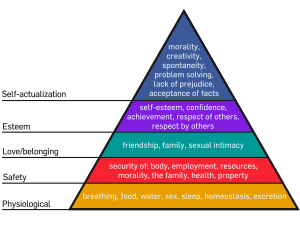 Image via Wikipedia
Image via WikipediaMichael Tobis has been blogging lately about possible hysteria about the BP Gulf oil spill. With the context being that (possibly) falsely predicting catastrophe with the BP Gulf oil spill may lead people to think that global climate disruption will also turn out to be less severe than the scientists are predicting.
Mega-Disaster in the Gulf? Or Not?
Horizon - Backing Off Optimism
Reality vs Model
> But I'm starting to see the problem that many people have with others' eagerness toward predictions of catastrophe.
I wish there was an easy way to talk about and visualize a hierarchy of concerns. Capable humans naturally understand a hierarchy of concerns, where lower concerns only come into play once higher concerns are reasonably satisfied (like my concern for hydration is below my concern for respiration, and both of these are above my concern for oil-free aquatic bird life). And sibling concerns may be substitutable or complementary and have a ranking or command a fraction of a whole.
(This is like Maslow's hierarchy of needs [http://en.wikipedia.org/wiki/Maslow's_hierarchy_of_needs], but more individually specific and more detailed. Also, it is inverted: the "base" concerts are at the top. Also, it is not entirely clear that "self-actualization" is at the extreme: I see global/group concerns as being predicated on successful self-actualization. A hierarchy of concerns could have no set limit on levels deep.)
The mainstream media handles concerns like a preschooler on a sugar rush - one big shiny new concern can push out all others, irrationally and ineffectively, rendering the news consumer incapable.
Maybe a little web widget that displays the hierarchy of concern, interactively. A hierarchy, running from the mundane but individualistic corporally viscerally urgent all the way down to the global political abstract. And is easily updatable with new information. And tools to meaningfully compare between hierarchies, of different people or the same at different times.
And tools to draw attention, to yourself (and embarrassingly to others), that inconsistencies exist (I am much more interested in finding out inconsistencies and conflicts between my concerns than I am in maintaining the illusion of perfect consistency from yesterday to today and the illusion of omniscience). Because mundane actions have global political abstract consequences, and the global political abstract imply certain mundane actions, and it is tempting to conveniently compartmentalize these two extremes, and conveniently ignore contradictions and inconsistencies.
Getting back to lacking models leading to overstating the potential for catastrophe -- it is hard to put appropriate demands on models without the context of this hierarchy of concern. Because the actionable decisions based on predictions of the models is a function of the demands put on the model during construction and manipulation and evaluation.
![Reblog this post [with Zemanta]](http://img.zemanta.com/reblog_e.png?x-id=491b955d-ed6d-440e-830e-7db2b81c488d)
1 comment:
Post a Comment